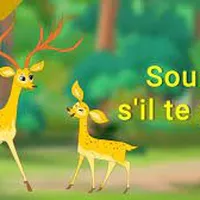Souris, s'il te plaît!
|lütfen||
Lächeln|wenn es|bitte|
Smile|if|you|please
|제발||
|||por favor
Lächel bitte!
Smile Please!
¡Sonríe por favor!
Tolong tersenyum!
Sorridi per favore!
笑顔してください!
웃어주세요!
Uśmiech proszę!
Ecrit par: Sanjiv Jaiswal
||Sanjiv|Jaiswal
||Sanjiv|Jaiswal
Written|by|Sanjiv|Jaiswal
|작성자||
Escrito||Sanjiv Jais|Jaiswal
Geschrieben von: Sanjiv Jaiswal
Written by: Sanjiv Jaiswal
Escrito por: Sanjiv Jaiswal
Ditulis oleh: Sanjiv Jaiswal
執筆者サンジブ・ジャイスワル
저자: Sanjiv Jaiswal
Scenariusz: Sanjiv Jaiswal
Yazan: Sanjiv Jaiswal
Un faon faisait la course dans la forêt.
A|fawn|was|the|race|in|the|forest
|um cervatinho|||corrida|||floresta
|새끼 사슴|달리다||경주|||숲 속
A|Rehkitz|machte||||die|Wald
bir|bambi|yapıyordu|||||
|un cerf giovane||||||
|小鹿||||||
Ein Reh raste durch den Wald.
A fawn was racing in the forest.
Un cervatillo corría por el bosque.
Seekor rusa berlari melintasi hutan.
小鹿が森の中を駆け抜けていった。
새끼 사슴이 숲을 질주하고 있었다.
Jelonek biegł przez las.
Bir yavru geyik ormanda koşuyordu.
Il a devancé le lapin.
||geçti||tavşan
Er|den|voraus|den|Hase
He|has|outpaced|the|rabbit
||앞섰다||
||ultrapassou||coelho
Er hat das Kaninchen geschlagen.
He was ahead of the rabbit.
Venció al conejo.
Dia mengalahkan kelinci tersebut.
彼はウサギに先手を打った。
그는 토끼를 이겼다.
Pobił królika.
Tavuğu geçti.
Il a même devancé l'éléphant.
|||geçti|fil
||sogar|overtook|den Elefanten
||even|outpaced|the elephant
||||o elefante
Er schlug sogar den Elefanten.
He was even ahead of the elephant.
Incluso venció al elefante.
Ia bahkan mengalahkan gajah.
象にも勝った。
그는 심지어 코끼리를 때렸습니다.
Pokonał nawet słonia.
Il a bondi au dessus du ruisseau.
It|above|leaped|over|above|of the|stream
||saltou||||riacho
|a|zıpladı||||dere
||gesprungen||above||
||튀어올랐다||위로||개울
||||||ruscello
||跳跃||||
Er sprang über den Bach.
He leapt and cleared the stream.
Saltó sobre el arroyo.
Dia melompati sungai.
彼は小川を飛び越えた。
그는 개울을 뛰어 넘었습니다.
Przeskoczył strumyk.
Ele saltou sobre o riacho.
Dereyi aştı.
Il est passé devant le mur en ruine.
He|is|passed|in front of|the|wall|by|ruin
|||||muro||ruína
|est||||||harabe halinde
|er|||||in|Ruine
||지나갔다|앞에|the|벽||무너진
|||||||破败的
Er ging an der zerstörten Mauer vorbei.
He ran past the crumbling wall.
Pasó junto a la pared en ruinas.
Dia melewati tembok yang hancur.
彼は廃墟と化した壁を通り過ぎた。
그는 무너진 성벽을 지나 걸었다.
Przeszedł obok zrujnowanej ściany.
Harabe duvarın önünden geçti.
Il y avait un gros rocher dans la plaine herbeuse.
||||||||ova|otlu
||hatte|ein|||||Ebene|grasende
|there|was|a|large|rock|in|the|plain|grassy
||있었다||큰|바위|||평원|풀밭의
|||||rocha|||planície|gramada
In der grasbewachsenen Ebene lag ein großer Felsbrocken.
There was a large boulder on the grassy plain.
Había una gran roca en la llanura cubierta de hierba.
Ada sebuah batu besar di dataran berumput.
草原に大きな岩があった。
초원에 커다란 바위가 있었다.
Na trawiastej równinie znajdował się duży głaz.
Çayırda büyük bir kayanın vardı.
Il a trébuché et il est tombé.
|has|stumbled|and|he|is|fall
||tombou||||caiu
||takıldı||||
||gestolpert||||
||넘어졌다||||넘어졌다
||scioccato||||
Er stolperte und er fiel.
He stumbled and fell down.
Tropezó y se cayó.
つまずき、転んだ。
그는 걸려 넘어졌다.
Potknął się i upadł.
Düşüp yere kapaklandı.
Il a éclaté en larmes.
||burst|into|tears
||explodiu||lágrimas
||터졌다||눈물
||ausgebrochen||
|a|||gözyaşları
||爆发||
Er brach in Tränen aus.
He burst into tears.
Se echó a llorar.
Dia menangis.
彼は涙を流した。
그는 눈물을 터뜨렸다.
Zalał się łzami.
Ele rebentou em lágrimas.
Ağlamaya başladı.
Le singe lui a massé la jambe,
|maymun|||masaj yaptı||
|Affe|||massiert||Bein
The|monkey|him|leg|massaged|the|leg
그|원숭이|||마사지했다||다리
|macaco|||massage||perna
Der Affe massierte sein Bein,
The monkey massaged his leg,
El mono masajeó su pierna,
Monyet itu memijat kakinya,
サルは彼の足をマッサージした、
원숭이는 다리를 마사지했고,
Małpa masowała mu nogę,
Maymun ona bacağını masaj yaptı.
mais les larmes du faon ont continué à couler.
but|the|tears|of the|fawn|have|continued|to|flow
||||||continuaram||cair
||||||||흘러내리
aber|||||haben|||
||gözyaşları||||devam etti||akmak
||||||||流下来
aber die Tränen des Rehs flossen weiter.
but tears still flowed from the fawn's eyes.
pero las lágrimas del cervatillo continuaron fluyendo.
namun air mata anak rusa itu terus mengalir.
しかし、小鹿の涙は流れ続けた。
그러나 새끼 사슴의 눈물은 계속해서 흘렀다.
ale łzy jelonka nadal płynęły.
ama yavru cerbezin gözyaşları akmaya devam etti.
Frère Ours l'a pris dans ses bras.
|Ayı|||||
Bruder|||||seinen|
Bro|Bear|it|taken|in|his|arms
|곰||안아주었다|||팔
|Urso|||||
Bruder Bär nahm ihn in seine Arme.
Brother Bear picked him up.
El Hermano Oso lo tomó en sus brazos.
Kakak Beruang menggendongnya dalam pelukannya.
ベア兄弟は彼を腕に抱きました。
곰 형제는 그를 품에 안았습니다.
Brat Niedźwiedź wziął go w ramiona.
Kardeş Ayı onu kollarına aldı.
Mais le faon pleurait d’encore.
|||ağlıyordu|
||Fawn||von noch
But|the|fawn|cried|again
|||울고 있었다|아직도
||||de novo
Aber das Reh weinte immer noch.
But the fawn did not stop crying.
Pero el cervatillo seguía llorando.
Namun, anak rusa itu masih menangis.
しかし、子鹿はまだ泣いていました。
그러나 새끼 사슴은 여전히 울고있었습니다.
Ale jelonek wciąż płakał.
Mas o filhote ainda estava chorando.
Ama yavru cerbez hâlâ ağlıyordu.
Sa mère est arrivée.
|어머니||도착했다
Ihre||ist|
Her|mother|has|arrived
|||geldi
Seine Mutter kam.
His mother came by.
Llegó su madre.
彼の母親が到着しました。
Przyjechała jego matka.
Sua mãe chegou.
Annesi geldi.
Elle lui a dit: “Viens, allons taper ce méchant rocher!”
||||와|가자|치다||못된|
sie|him|||||hauen|||
She|him|has|said|Come|let's|hit|this|mean|rock
||||vem|vamos|dar uma surra||malvado|
||||||||kötü|
Sie sagte zu ihm: "Komm, lass uns auf diesen fiesen Stein hauen!"
She said, “Look, we'll beat up this bad boulder!”
Ella le dijo: "¡Vamos, vamos a golpear esa roca asquerosa!"
彼女は彼に言った!
Powiedziała do niego: „Chodź, uderzmy w ten paskudny kamień!”
Ela disse a ele: "Vamos, vamos bater nessa pedra nojenta!"
Ona dedi ki: “Gel, bu kötü kayaya vurmayı gidelim!”
Le faon lui a répondu: “Oh non, ne fais pas ça ou il se mettra aussi à pleurer.”
||||||||||||||울 것이다|||울기
|Fawn|||geantwortet||||mach|||||sich||||
The|fawn|him|will|replied|Oh|no|don't|do|not|it|or|it|will|will put|also|to|cry
||||yanıtladı||||||||||metar|da||ağlamak
||||respondeu|Oh||||||||||||
Das Kitz antwortete: "Oh nein, tu das nicht, sonst fängt er auch an zu weinen."
The fawn said, “Oh no, don't do that or he will also start crying.”
El cervatillo respondió: "Oh, no, no hagas eso o él también comenzará a llorar".
小鹿は「そんなことしたら、彼も泣き出してしまうわ」と答えた。
Jelonek odpowiedział: „O nie, nie rób tego, bo też zacznie płakać”.
O cervo respondeu: "Oh não, não faça isso ou ele vai começar a chorar também."
Kuzu ona yanıtladı: “Ah hayır, bunu yapma yoksa o da ağlamaya başlayacak.”
Sa mère a ri comme le faon aussi.
|||güldü||||
|ihre Mutter||lachte|||Rehkitz|
Her|mother|has|laughed|like|the|fawn|too
|||웃었다||||
|||rido||||
Seine Mutter lachte auch wie das Reh.
His mother laughed and so did the fawn.
Su madre también se rió como el cervatillo.
母親は小鹿と同じように笑った。
Jego matka też śmiała się jak jelonek.
Sua mãe também ria como um cervo.
Annesi de bir yavru geyik gibi güldü.

